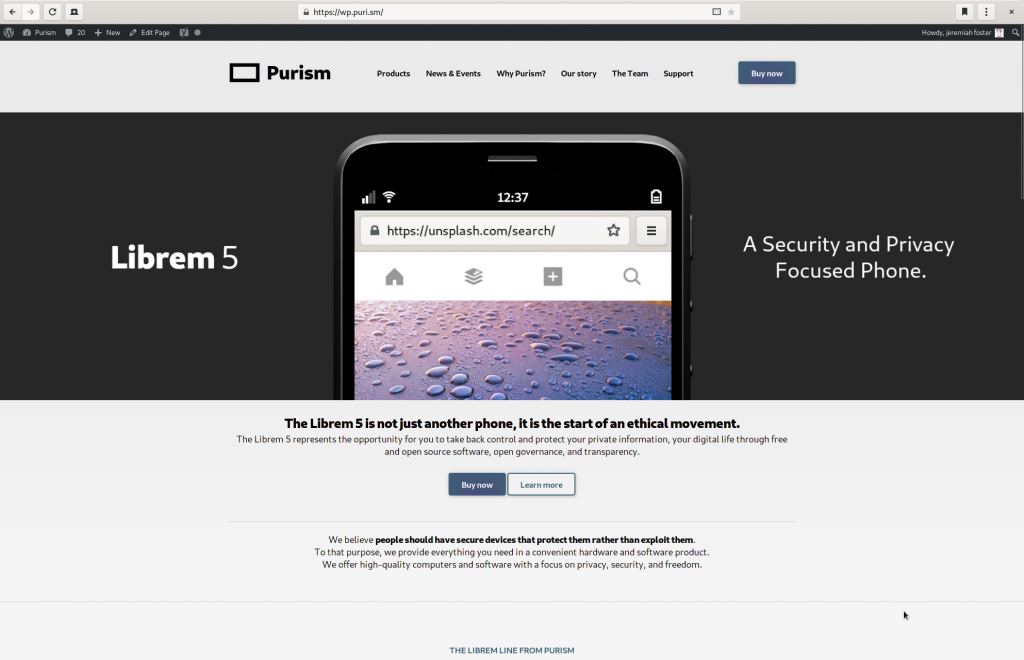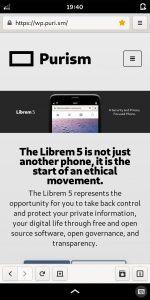An Epiphany regarding Purebrowser
Purism
Latest posts by Purism (see all)
- A Quarter Century After Cyberselfish, Big Tech Proves Borsook Right - December 20, 2025
- PureOS Crimson Development Report: November 2025 - December 15, 2025
- Purism Liberty Phone Exists vs. Delayed T1 Phone - December 10, 2025
Purebrowser and the “the power of defaults”
As most folks know, PureOS has a customized browser known as Purebrowser. Purebrowser is a great example of what Todd Weaver calls, “the power of defaults”. What I’ve understood that to mean is that default settings are a powerful way to provide users with privacy protecting safeguards and convenience “out of the box”. The goal with sane defaults was always to make life easier for our users by making choices that we believe protect privacy so that the user wouldn’t have to dig into confusing configuration options. We try and bring sensible, privacy protecting default settings to our Purebrowser each time there is a new release from upstream which is the Firefox Extended Support Release. Our customization begins with the choice of browser to start with and it continues well beyond that. In fact, the vision that our CSO has is of a browser that can run in an isolated sandbox and can even be disposable to not keep any information on the user.
More adaption, less adoption
As we’ve been working on the software for our new device, the Librem 5, we’ve done a lot of work to adapt our existing code base to the phone. Aside from being a touch screen, the handheld phone requires a good deal of work to adapt software to the phone’s form factor. As we do this work, spinning off software libraries that are entering the software ecosystem widely, we get to take advantage of it

in PureOS on all our platforms. This is the whole point of making PureOS convergent – to use a single code base across devices. This way, every librem device (not just every Librem 5, 13, 15) benefits from the work done in PureOS. We believe this will result in a more robust code base, with a stable set of APIs, and a simple way to develop secure software for all our devices.
Having a web Epiphany

To make our CSO’s vision a reality we’re planning on moving away from Firefox ESR as our default and towards the default GNOME Web browser called “Epiphany”. While Firefox ESR is a great browser, and will remain in our repositories, it is a lot of maintenance to apply the patches to get it to where we feel is the right state for our users. We’ve discussed our changes with upstream but they have their own vision, their own business needs. In addition, we’re investing in building out the ecosystem of convergent, privacy protecting, free software, and that investment is being realized in our Librem phone. We want to continue to build on our convergence and moving towards Epiphany will continue that as well as get us closer to our goal of one code base on all our devices, which of course the whole point of convergence.
Once we’re working from one code base, which we’re tantalizingly close to, we’re able to do some pretty exciting things. We’ll truly have a secure communications platform with a supply chain we have deep insight into, that we’ve designed and control from silicon to pixel. That is a bit of an accomplishment.
Discover the Librem 5
Purism believes building the Librem 5 is just one step on the road to launching a digital rights movement, where we—the-people stand up for our digital rights, where we place the control of your data and your family’s data back where it belongs: in your own hands.

Recent Posts
Related Content
- Librem PQC Encryptor: Future‑Proofing Against Both SS7 and Quantum
- The NYPD’s $3B “Domain Awareness System” isn’t just a New York problem—it’s a warning for every American
- PureOS Crimson Development Report: July 2025
- Is Google’s AI Reading Your Private Messages? Why It’s Time to Consider a Secure Alternative
- After a week, Trump Mobile drops claim that the T1 Phone is “Made in the USA”


